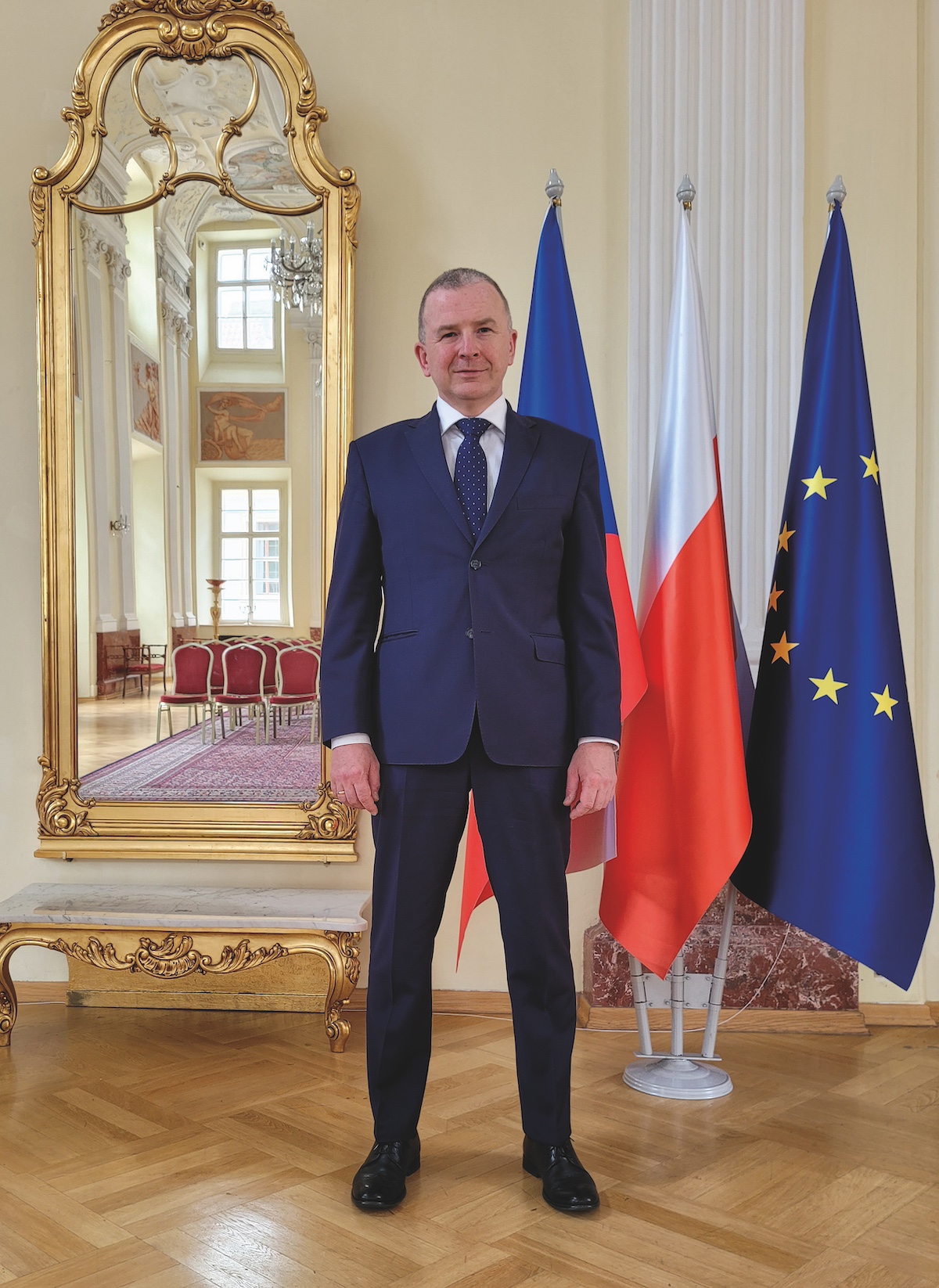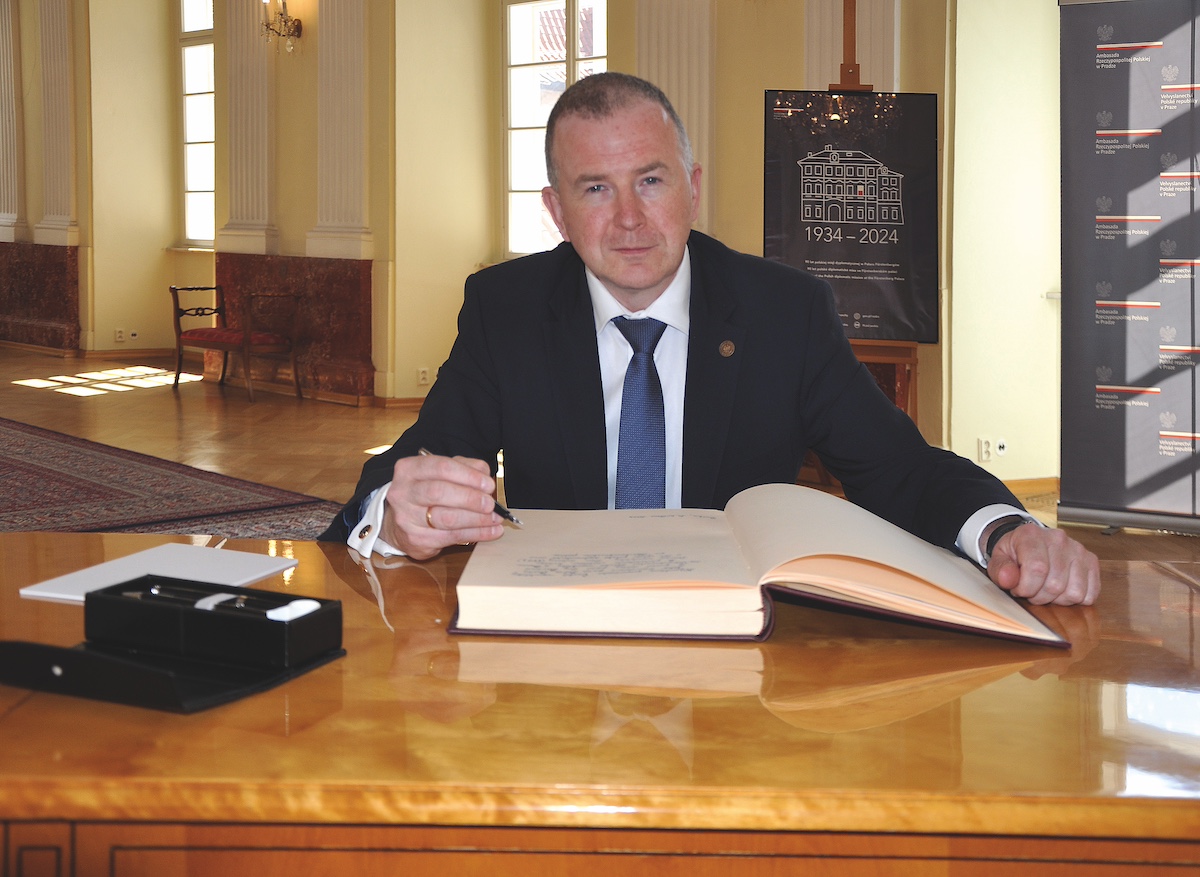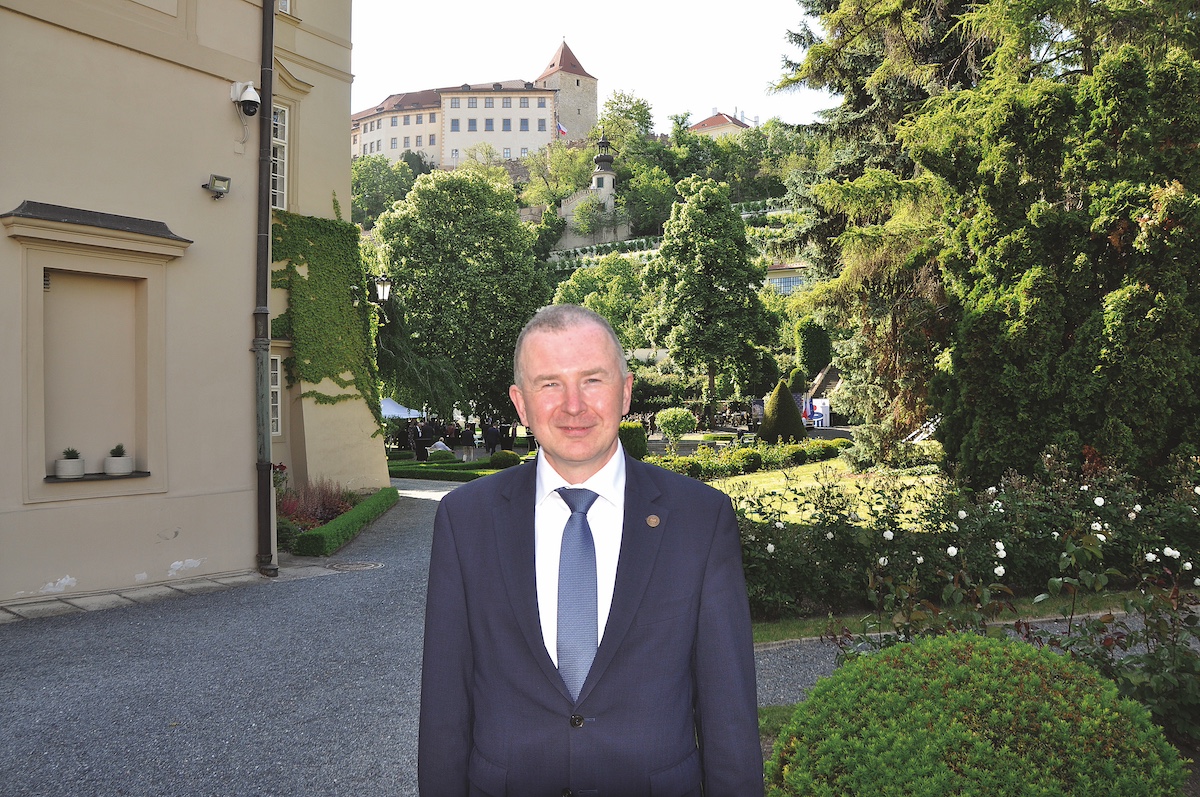“We became acutely aware of how close we are”

H.E. Mr. Mateusz Gniazdowski, Ambassador of Poland
Text: Martina Hošková and M.Zisso; Photo: Archive
Can you tell us about yourself?
I have the honour to have served as Ambassador of the Republic of Poland to the Czech Republic from September 2022. I have been professionally involved in Polish foreign policy since 2004. In the year of Poland’s accession to the European Union, I started working at the Polish Institute of International Affairs (PISM), later working at the Centre for Eastern Studies (OSW) – a state analytical institution subordinate to the Prime Minister’s Office.
I headed OSW’s Central European Department, and in 2016 became OSW’s deputy director. Before that, I defended my doctoral thesis on the history of Polish- Czechoslovak relations at Komenský University in Bratislava, which I wrote at the Institute of Political Science of the Slovak Academy of Sciences.
My wife is a professional diplomat, who has worked at the Ministry of Foreign Affairs since 2006 and was deputy director of the Polish Institute in Prague from 2017 to 2020. It is also for this reason that we have been connected to the Czech Republic for years. Our two teenage daughters have spent a large part of their childhood and education in Prague.
How did you become an ambassador?
While working at PISM and later at OSW, and dealing with Central Europe, I paid a lot of attention to Czechia. This went beyond analytical work – in my academic work, I dealt with Polish-Czech relations, as well as with public diplomacy as a practitioner. In 2013, Foreign Minister Radosław Sikorski appointed me chairman of the Programme Board of the Polish-Czech Forum – a bilateral grant and advisory instrument affiliated with the Foreign Affairs Ministries of both countries, supporting Polish-Czech cooperation.
Foreign Minister Zbigniew Rau offered me the ambassadorial post in Prague in February 2022, when Polish-Czech relations were in crisis over a dispute over the cross-border effects of mining at the Turów lignite mine. My nomination presented me as an expert, which was demonstrated in a hearing before the Foreign Affairs Committee of the Polish Sejm and the acceptance of my candidature by acclamation by all members of the Committee, regardless of party affiliation.

H.E. Mr. Mateusz Gniazdowski, Ambassador of Poland
Did you have to change your lifestyle after assuming the ambassadorial post?
I took up the post fully aware that I would no longer be the master of my own time – it is a most important lifestyle change. However, my previous work in analytical positions included a number of aspects that allowed me to enter the world of diplomacy without major problems. The international contacts to date, the many friends in Prague, the constant networking, the advisory work and promotion of Polish analytical thought, as well as the public diplomacy carried out in the Polish-Czech Forum, meant that I was able to treat my mission as a more intensive continuation of my previous activities. One change I did have to get used to was the large amount of time-consuming traditional rituals that still characterise this rather conservative profession: the work of an ambassador.
You have been in the Czech Republic for a year and a half. Can you share your impressions?
My first impressions were very good – I encountered friendliness and openness. After several years of vacancy or staffing problems for the head of the Polish diplomatic mission in Prague, I heard the word ‘finally’ more or less clearly everywhere.
I arrived in September 2022, when the Turów agreement was already being implemented. There was a general expectation in Prague that this impetus should be used for a ‘new opening’ in Polish-Czech relations. And, even more importantly, Russia’s full-scale invasion of Ukraine was underway, bringing our countries together in support of the invaded country. Poland and the Czech Republic cooperated closely from the first hours of the invasion. We became acutely aware of how close we were, and how similar our threat perception and common values were.
From the beginning, the friendly contacts in the diplomatic corps were a huge support for me. I am very grateful to my colleagues for their kind reception. My first two courtesy visits – to the Lithuanian ambassador and the German ambassador – were particularly memorable.
What is the most difficult part of being an ambassador?
A difficult question. In a position like this, sometimes you have to be able to say ́no comment ́, although the nature of an expert and advisor who has had no problem with being candid over the years may suggest otherwise…
You mentioned not being the master of your own time anymore. Do you have any free time at all then?
Working as an analyst, I did not break with historical research, and published at least one academic article every year. Paradoxically, I wrote one of my last research papers before coming to Prague (not knowing about the appointment yet) about the work of the Polish embassy in Prague in the early 1990s. I no longer have time to write historical studies, but I sometimes try to find a moment to read a history book. I am often away from Prague on business, especially in the Polish-Czech border regions, and I like to return there sometimes in my free time too.
You are an expert on the internal and foreign policy and regional cooperation of the Central European countries, especially the Visegrad countries. How do you see the situation now and in the future?
I came to Prague during a crisis in Visegrad cooperation. At that time, differences in attitudes towards Russia’s revisionist policy were already affecting the intensity of this cooperation. The Slovak presidency of the V4 was characterised by restraint, which was also assumed by the Czech side. Complications were already demonstrated at the planning level by the fact that the programme of the Czech V4 presidency was, for the first time, not agreed and accepted as a joint document, but only acknowledged as a Czech proposal. The change of government in Slovakia and the perplexities in Czech-Slovak relations further complicated this cooperation.
Poland takes over the presidency of the V4 from the Czechs in mid- 2024, which further prompted our two countries to coordinate more closely. It was possible to introduce the custom of Polish-Czech meetings ahead of some V4 meetings – thus Prime Ministers Donald Tusk and Petr Fiala met in Prague, and a bilateral visit by Foreign Minister Radosław Sikorski preceded a meeting of V4 ministers. The Prague meetings of the V4, including the heads of states and presidents of Parliaments, were frank discussions that con- firmed differences in views on security issues and values, but also showed the need for continued cooperation, as well as a certain scope of common interests.
The V4 has its achievements and potential, but, as Mr Sikorski recently mentioned in the Sejm, it has changed its nature and “using an instrument inappropriately could damage it”. The V4 will therefore be useful for sectoral cooperation on infrastructure issues, or for efforts to protect the external borders of the Schengen area. Infrastructural cooperation in our part of the EU is also supported by the Three Seas Initiative. This is a further format that provides an opportunity for the Czechs to cooperate in the Baltic Sea region. For the security issues of NATO’s eastern flank, especially concerning improving coordination between the allies from the Baltic Sea to the Black Sea, the Bucharest Nine (B9) format also serves a useful function.

H.E. Mr. Mateusz Gniazdowski, Ambassador of Poland
Poland is perceived as a pleasant holiday destination by a growing number of Czech people. How do you promote your country?
I have been dealing with Czechia and Polish-Czech relations for over two decades, and there has never been such a good situation for the promotion of Poland in Czechia as at present. Poland has become a positive reference point in many areas, such as the development of transport infrastructure, digitalisation, defence, and the use of EU funds. Due to price differences, many Czechs come to Poland to go shopping, and have started to appreciate Polish products. And yes, in recent years, an increasing numbers of Czechs have also been coming to Poland for holidays.
We are trying to promote what Poland can offer to Czechs more actively; an office of the Polish Tourist Organisation has been operating in Prague for a year now. Our priority is to invite people to Poland. It is not just about business – a trip to Poland is the best possible promotion of our country, a panacea for all stereotypes and prejudices, which are slowly becoming obsolete. Sociological studies show that sympathies for Poland are steadily growing. We started at the beginning of the 1990s from a very low level, and Poland is now among the countries most liked by Czechs. If I might add, we are beaten only by countries very much historically close to the Czechs such as Slovakia and Austria, which provides a reason for satisfaction.
Can you evaluate the current status of Czechia-Poland relations in more detail?
As I mentioned, in these extremely difficult times for Europe and our region, we have good momentum in our bilateral relations. This applies to political, as well as economic and social, issues. Our trade volumes are impressive (reaching €33 billion in 2023). After Germany, Czechia is the second destination of Polish exports (€22 billion). Foreign Minister Sikorski, speaking in the Sejm about Polish foreign policy priorities, mentioned that Poland’s most important partners in the EU are Germany and France, while, at the same time, Czechia was identified – along with the Nordic countries, Baltic states, and Romania – as “our very valuable and future-oriented allies”. The minister added that “these are countries with whom we understand each other without speaking” – but this does not mean that we do not talk!
President Petr Pavel followed his election with a visit to Poland after his traditional first visit to Slovakia. This year, Prime Minister Donald Tusk and Foreign Minister Sikorski have already been in Prague, and, on the occasion of the V4 summit, the presidents of both chambers of the Polish parliament also visited Prague. Intergovernmental consultations are to take place in the autumn. Polish-Czech cooperation is intense and friendly.
This interview is done on the occasion of Poland’s national day. What do you wish for your country? And for the Czech Republic?
Our countries and nations have passed a tough test with flying colours – supporting the invaded Ukraine, welcoming refugees, and correctly diagnosing the dangers of Russian imperialism and revisionism. I would like us to better realise that we are passing the test exemplarily. This not only gives us legitimate moral credit, but will also strengthen our security in the long term and translate into economic strength for our region. We have been co-creating Europe for over a thousand years. Let us today have the courage to co-create the European Union on a fully-fledged basis and to clearly articulate our interests and expectations.
My wish for all of us is that Central Europe will emerge from this time of war and crisis stronger, making the entire European Union stronger and more resilient. Our national holiday on the third of May commemorates one of the first constitutions in the world – the Constitution of the Polish–Lithuanian Common- wealth (1791), which remains to this day a source of inspiration as an example of cooperation for state reform in the spirit of freedom and independence.
To the readers of Czech & Slovak Leaders magazine, I wish you all the best, and I would like to thank the editorial team for your activities supporting the integration of the diplomatic corps in an atmosphere of understanding and cooperation.

